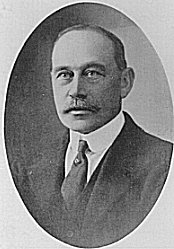Henry W. Keyes
| Henry Wilder Keyes | |
|---|---|
 |
|
| 56th Governor of New Hampshire | |
|
In office January 2, 1917 – January 6, 1919 |
|
| Preceded by | Rolland H. Spaulding |
| Succeeded by | John H. Bartlett |
|
United States Senator from New Hampshire |
|
|
In office March 4, 1919 – January 3, 1937 |
|
| Preceded by | Henry F. Hollis |
| Succeeded by | Styles Bridges |
| Member of the New Hampshire Senate | |
|
In office 1903–1905 |
|
| Member of the New Hampshire House of Representatives | |
|
In office 1891–1895 1915–1917 |
|
| Personal details | |
| Born |
May 23, 1863 Newbury, Vermont |
| Died | June 19, 1938 (aged 75) Haverhill, New Hampshire |
| Political party | Republican |
Henry Wilder Keyes (pronounced to rhyme with "lies") (May 23, 1863 – June 19, 1938) was a Republican politician from Haverhill, New Hampshire. He served as Governor of New Hampshire and as a United States Senator.
Keyes was born in Newbury, Vermont on May 23, 1863. He was raised in New Hampshire, and his father was a prominent farmer, merchant, and railroad investor. Keyes graduated from Adams Academy, and then attended Harvard University, from which he graduated in 1887. He was a farmer and cattle breeder, and initiated raising of the Holstein-Friesian breed in the United States. He was also a founder of the Woodsville National Bank, and served as its president.
Keyes served in the New Hampshire House of Representatives from 1891 to 1895. He served in the New Hampshire State Senate from 1903 to 1905. He was treasurer of the State license commission from 1903 to 1915, and chairman of the State excise commission from 1915 to 1917. from 1915 to 1917 he served again in the state House of Representatives.
In 1916 he was elected Governor of New Hampshire, and he served one term, 1917 to 1919.
Keyes ran successfully for the United States Senate in 1918. He was reelected in 1924 and 1930 and served from March 4, 1919, to January 3, 1937. he did not run for reelection in 1937.
During his Senate career, Keyes served as chairman of: the Committee on Expenditures in the Post Office Department (Sixty-sixth Congress); Committee to Audit and Control the Contingent Expenses (Sixty-eighth and Sixty-ninth Congresses); and Committee on Public Buildings and Grounds (Seventieth through Seventy-second Congresses).
Keyes married future prolific author Frances Parkinson Keyes in 1904. He was 40, she was 18. They had three sons together—Henry Wilder Keyes, Jr., John Parkinson Keyes, and Francis Keyes.
...
Wikipedia
